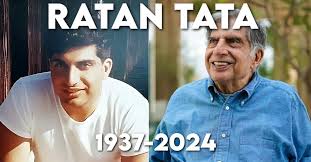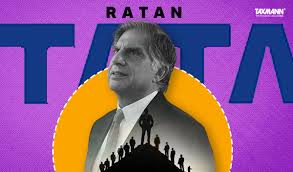Ratan Tata is a name synonymous with visionary leadership, ethical business practices, and a commitment to philanthropy. Born on December 28, 1937, in Bombay (now Mumbai), Ratan Naval Tata is one of India’s most revered industrialists. His life is a testament to perseverance, humility, and an unwavering belief in the potential of India and its people. Here’s the inspiring story of Ratan Tata, a man who transformed the Tata Group into a global conglomerate and continues to inspire millions.
Early Life and Education
Ratan Tata was born into the illustrious Tata family, a legacy deeply rooted in India’s industrial and philanthropic history. However, his early life was not devoid of challenges. His parents, Naval Tata and Sonoo Tata, separated when he was just ten years old. Ratan and his younger brother, Jimmy, were raised by their grandmother, Lady Navajbai Tata, who played a pivotal role in shaping their values and character.
Ratan Tata completed his schooling at Campion School and Cathedral and John Connon School in Mumbai. He later went to the United States, where he earned a degree in Architecture from Cornell University in 1962. Following this, he pursued the Advanced Management Program at Harvard Business School in 1975. His time abroad broadened his perspective and laid the foundation for his future endeavors.
Early Career and Entry into Tata Group
Ratan Tata’s journey with the Tata Group began in 1962 when he joined Tata Steel’s Jamshedpur plant as a trainee. This humble start at the shop floor, shoveling limestone and handling furnaces, was a deliberate move to understand the intricacies of the business from the ground up. It reflected his belief in leading by example and earning respect through hard work.
In 1971, he was appointed the Director-in-Charge of the National Radio and Electronics Company Limited (NELCO), a struggling Tata company. Despite his efforts to revive the business, external challenges, including labor issues and economic instability, led to limited success. However, this experience taught Ratan Tata invaluable lessons in resilience and crisis management.
Leadership of the Tata Group
Ratan Tata’s true test came in 1991 when he succeeded J.R.D. Tata as the Chairman of the Tata Group. At the time, the group was a collection of disparate companies, each operating autonomously. One of his first moves was to streamline operations and bring all Tata companies under a unified brand.
Ratan Tata emphasized innovation, technology, and globalization. He envisioned transforming the Tata Group into a global powerhouse. Under his leadership, the group expanded its presence in various sectors, including steel, automobiles, IT, and telecommunications.
Major Achievements
One of Ratan Tata’s most significant achievements was the acquisition of several international companies, which put the Tata Group on the global map. In 2000, Tata Tea acquired Tetley, a leading tea brand in the UK. This was followed by the acquisition of Corus, a European steelmaker, in 2007, and the iconic British automotive brands Jaguar and Land Rover (JLR) in 2008. These bold moves not only showcased Tata’s global aspirations but also cemented India’s position in the international business arena.
Another landmark achievement was the launch of the Tata Nano in 2008. Marketed as the “people’s car,” the Nano was designed to make car ownership accessible to millions of Indians. While the project faced several challenges, including production delays and public skepticism, it demonstrated Ratan Tata’s commitment to innovation and social responsibility.
Ethical Leadership and Values
Ratan Tata is widely admired for his ethical leadership and integrity. He has always prioritized long-term sustainability over short-term gains. During the 26/11 Mumbai terror attacks in 2008, the Taj Mahal Palace Hotel, owned by the Tata Group, was one of the primary targets. Ratan Tata personally oversaw the relief efforts, ensuring that employees and their families were supported. His humane approach during the crisis earned him widespread respect.
Philanthropy and Social Impact
Philanthropy has been at the core of the Tata legacy, and Ratan Tata has carried this tradition forward. Over 60% of the Tata Group’s profits are directed towards charitable causes through trusts like the Sir Dorabji Tata Trust and the Sir Ratan Tata Trust. These initiatives have funded education, healthcare, rural development, and scientific research.
Ratan Tata has also supported numerous individual causes. For instance, he played a significant role in funding education and empowering underprivileged communities. His contributions to institutions like the Indian Institute of Technology (IIT) and Harvard University reflect his commitment to nurturing talent and fostering innovation.
Life Beyond Business
Despite his monumental achievements, Ratan Tata remains a deeply private and humble individual. He is known for his love of cars, aviation, and architecture. An avid philanthropist, he continues to mentor young entrepreneurs and support startups through his venture capital fund, RNT Associates.
Ratan Tata’s personal life has often been a subject of curiosity. Despite never marrying, he has spoken candidly about his relationships and the choices he made. His grounded nature and emphasis on personal values have endeared him to people from all walks of life.
Awards and Recognition
Ratan Tata’s contributions to business and society have earned him numerous accolades. He has received the Padma Bhushan (2000) and the Padma Vibhushan (2008), India’s third and second-highest civilian honors, respectively. He has also been honored by international organizations and governments for his contributions to global business and philanthropy.
Legacy and Inspiration
Ratan Tata retired as the Chairman of the Tata Group in 2012, passing the baton to Cyrus Mistry. However, his influence on the group and the business world at large remains indelible. He continues to serve as Chairman Emeritus of Tata Sons and remains actively involved in philanthropic initiatives.
Ratan Tata’s story is more than just a tale of corporate success; it is a narrative of vision, compassion, and resilience. He has shown the world that businesses can thrive while making a positive impact on society. His emphasis on ethics and social responsibility sets a benchmark for leaders worldwide.
Conclusion

Ratan Tata’s journey from a young boy raised by his grandmother to a global business icon is nothing short of extraordinary. His life exemplifies the power of determination, humility, and a relentless pursuit of excellence. As he continues to inspire generations, Ratan Tata remains a beacon of hope and a symbol of India’s potential to lead on the global stage.

